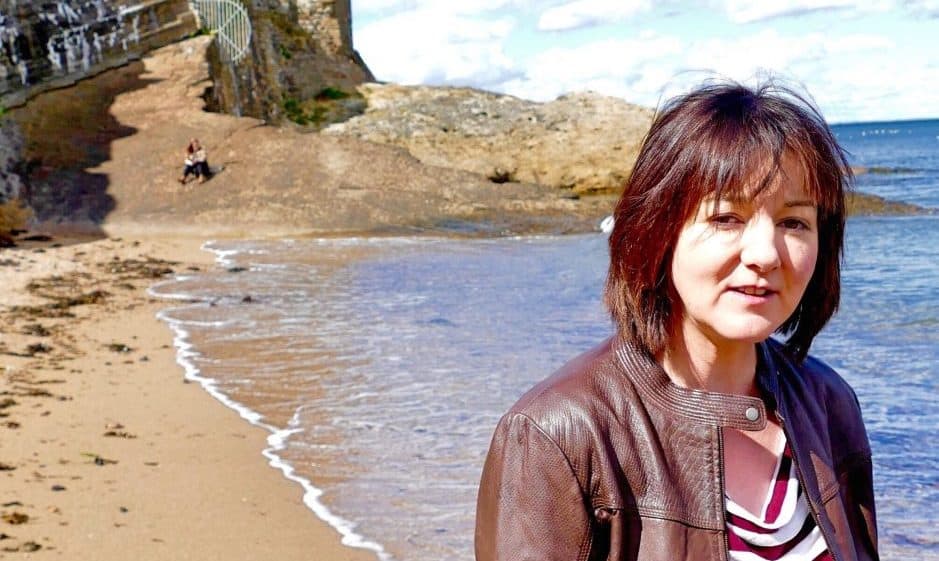For the first time a poem in Scots has won the annual £1,500 international Wigtown Prize for poetry.
Shiftin, by Mhairi Owens, was among entries from poets from as far afield as the USA, China, Canada and Ecuador, writing in English, Scots and Scottish Gaelic.
This year, the Wigtown Prize was opened up to entries in Scotland’s three languages for the first time, marking the 2019 United Nations International Year of Indigenous Languages.
Mhairi, who lives in Anstruther, works in the community and also tutors in creative writing at the University of St Andrews, said:“I was delighted to get the news that Shiftin had won the Wigtown Prize on a dreich Friday night.
“It’s literally a slim wee poem, but uses some very beautiful and unique Scots words and phrases. It’s right that many of us who use Scots in our everyday communication should use it in our poetry.”
As in previous years there were also dedicated categories, with top prizes of £500, for the best Scots and Scottish Gaelic poems that were won by Dorothy Lawrenson and Daibhidh Eyre respectively.
The second annual Dumfries and Galloway Fresh Voice Award also celebrates talent linked to the area and was won by Clare Phillips.
The new Alastair Reid Pamphlet Prize – commemorating one of the country’s most distinctive voices – for a short body of poems – was awarded to Beverley Bie Brahic.
The prizes will be awarded at a ceremony on 5 October at Bladnoch Distillery as part of the Wigtown Book Festival.
Marjorie Lotfi Gill, who chairs the Wigtown Book Festival Board of Trustees, said:“This year has involved a real step change for the Wigtown Poetry Competition.
“The Wigtown Prize is recognised as a significant international award and we are proud that it now provides an equal platform for work in all three of Scotland’s indigenous languages.
“It’s fitting that this year’s winning poem is Mhairi Owens’ wonderful Scots poem Shiftin.
“We are also extremely pleased that there has been an enthusiastic response to other changes, like the introduction of the new pamphlet competition commemorating Alastair Reid, which allows us to celebrate a short body of work.”
This year’s other winners are:
Daibhidh Eyre, from Coatbridge is currently living in Guangzhou in China, teaching English for Education First, said:“It’s great that the Wigtown Poetry Competition gives proper recognition to the importance of Scottish Gaelic and I feel very honoured, especially when you look at all the poets who have won this prize in years gone by.”
Dorothy Lawrenson, who lives in Edinburgh and is studying for a PhD in Creative Writing at the University of Edinburgh, said:“It’s fantastic that such a prestigious prize celebrates all three of Scotland’s languages. I wrote my first poem in Scots less than four years ago so I’m absolutely thrilled by the recognition, and hope it will encourage others to have a go at writing in Scots.”
This year the competition has new partnerships, including with StAnza, and is building on its established relationships with the Gaelic Books Council, the Saltire Society, The Scottish Poetry Library and others.
Asif Khan, Director of the Scottish Poetry Library, said:“The Wigtown Poetry Prize has quietly become one of the most important, outward facing awards in the UK. We’re delighted to be associated with it and delighted at the calibre and quality of this year’s entries and winners.”
Sarah Mason, Programme Director of the Saltire Society said:“The Saltire Society is pleased to have supported this important prize for Scots poetry again, particularly as we celebrate indigenous languages this year. Congratulations to Mhair
Eleanor Livingstone, StAnza’s Festival Director, added: “How excellent to see such a varied range of winners coming through this year, amongst such a high quality shortlist.
“Congratulations to Mhairi, and also to Daibhidh, who was Poet in Residence at StAnza 2018, Dorothy, Beverley and Clare. I look forward to seeing the poems in due course.”
Alison Lang, The Gaelic Books Council, said: “We at the Gaelic Books Council are proud of all the poets who have been shortlisted, and we warmly congratulate DaibhidhEyre, the winner of the Gaelic prize, and the others who have achieved success in this year’s competition. It is our privilege to support the Wigtown poetry competition, and it gives us great satisfaction to see new talent emerging as a result of this opportunity.”






